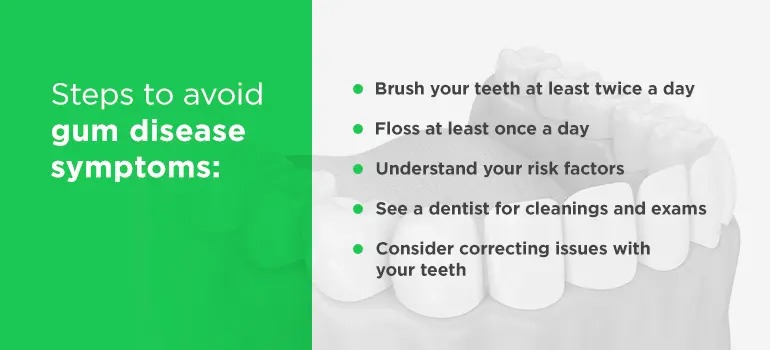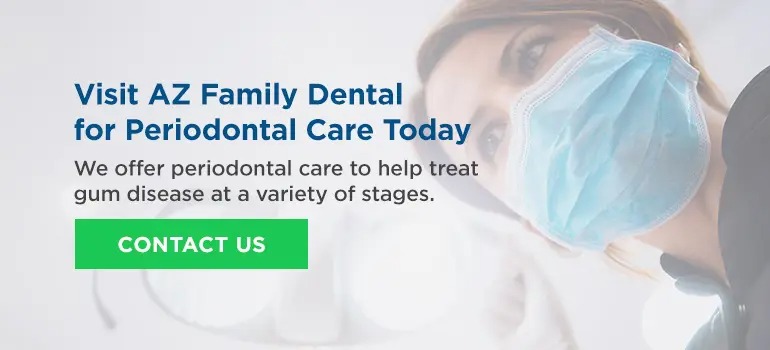
Gum disease, or periodontal disease, is more common than you might think. More than 47% of adults over the age of 30 have some form of gum disease, and more than 70% of people over age 65 have it. Although gum disease is common, it’s not inevitable. Knowing how to prevent gum disease can help you keep your mouth healthy. The dentists at AZ Family Dental are happy to work with you to protect your teeth, gums and other parts of your mouth. Dr. Justin Ewell and Dr. Matt Parker are both passionate about dentistry and dedicated to helping their patients to achieve beautiful smiles. Learn more about the causes of gum disease, ways to keep your gums healthy, and what gum disease treatments are available.
Gum disease occurs when the gums, which hold the teeth in place, become infected or inflamed. A buildup of bacteria in the mouth is usually the cause of gum or periodontal disease.
Everyone has mouth bacteria. When you eat and drink, the sugar in your food provides food for the bacteria in your mouth. The bacteria then form plaque, a sticky substance that coats your teeth and gums. When you brush your teeth and floss, you remove some of the plaque, helping to protect yourself from gum disease and cavities. If you don’t brush your teeth regularly, however, the plaque can harden, forming a substance called tartar. Tartar is a lot more difficult to get rid of than plaque. You’ll usually need to see a dentist for a professional cleaning if you have a lot of tartar build-up.
Not only is tartar tricky to remove, but it can also irritate your gums, creating inflammation. When the gums are inflamed, they bleed more easily. They can also start to pull away from the teeth, creating pockets where more bacteria can grow.
Although gum disease can happen to anyone, some people are more at risk for developing it than others. Smoking cigarettes or using tobacco products increases your risk of gum disease, for example. Other risk factors include:

When it comes to gum disease, preventing it is often preferable to having to treat it. Preventing gum disease naturally is relatively simple, as long as you follow a regular oral care routine and see a dentist regularly. The following steps can help you avoid gum disease symptoms:
If it’s been more than six months since your last visit to the dentist, it’s time to schedule a new appointment. During your visit, a dentist will clean your teeth, examine your teeth and gums, and answer any questions you have about gum disease and oral hygiene.
Although gum disease often does not have signs or symptoms until the later stages, there are things to keep an eye out for. If you notice any of the following, it’s a good idea to schedule an appointment with a dentist:
During your visit, the dentist will examine your mouth, clean your teeth and gums, and talk to you about treatment options, if needed. In the earliest stages, a deep cleaning and regular follow-up with a dentist can be enough to reverse gum disease. More advanced forms of the disease usually require more in-depth treatments, including surgery in some cases.

The dentists at AZ Family Dental value the health of your teeth and gums. We understand that the health of your mouth reflects the health of your body overall. We offer periodontal care to help treat gum disease at a variety of stages. We are also happy to discuss preventive care measures you can take to reduce the risk of gum disease. Contact us today to learn more and to schedule an appointment.